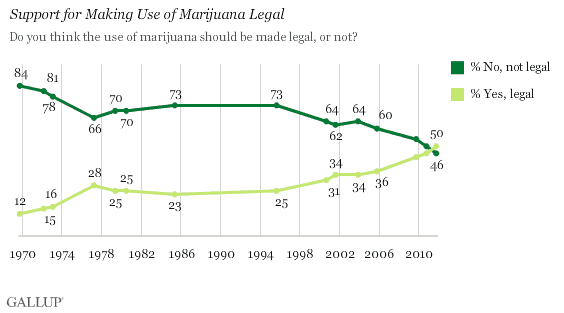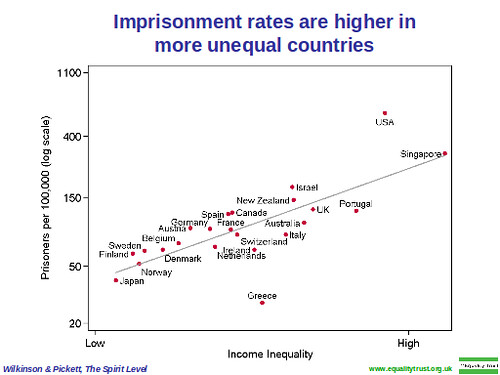Just a decade ago, private prisons were a dying industry awash in corruption and mired in lawsuits, particularly Corrections CorporationWe’d already heard from Bloomberg that Continue readingof America (CCA), the nation’s largest private prison operator. Today, these companies are booming once again, yet the lawsuits and scandals continue to pile up. Meanwhile, more and more evidence shows that compared to publicly run prisons, private jails are filthier, more violent, less accountable, and contrary to what privatization advocates peddle as truth, do not save money. In fact, more recent findings suggest that private prisons could be more costly.
So why are they still in business?
In a recently published report, “Banking on Bondage: Mass Incarceration and Private Prisons,” the American Civil Liberties Union examines the history of prison privatization and finds that private prison companies owe their continued and prosperous existence to skyrocketing immigration detention post September 11 as well as the firm hold they have gained over elected and appointed officials.
Tag Archives: CCA
Marijuana prohibition had nothing to do with smoking it
Kathleen Murphy wrote for the Washington Free Press 3 June 2009 about How Marijuana Became Illegal,
As the methods for processing hemp into paper and plastics were becomingAnslinger and Hearst made up whatever propaganda they thought might scare the public into supporting prohibiting hemp: Continue readingmore readily available and affordable, business leaders including William Randolph Hearst and DuPont stood to lose fortunes. They did everything in their power to have it outlawed. Luckily for Hearst, he was the owner of a chain of newspapers. DuPont’s chief financial backer Andrew Mellon (also the Secretary of the Treasury during President Hoover) was responsible for appointing Harry J. Anslinger, in 1931 as the head of the Federal Bureau of Narcotics and Dangerous Drugs.
Fighting gangs by legalizing pot
Richard Orange wrote for GlobalPost yesterday, A win-win on drugs? Fighting gangs by legalizing pot,
Not just drug toleration. Legalization: Continue readingCopenhagen’s city municipality voted in recent weeks, 39 votes to 9, to empower its social affairs committee to draw up a detailed plan to legalize cannabis.
If that plan is approved by Denmark’s new left-of-centre parliament next year, the city could become the first to legalize marijuana, rather than simply tolerate it, as police do in the Netherlands.
“We are thinking of perhaps 30 to 40 public sales houses, where the people aren’t interested in selling you more, they’re interested in you,” Mikkel Warming, the mayor in charge of social affairs at Copenhagen City Council told GlobalPost. “Who is it better for youngsters to buy marijuana from? A drug pusher, who wants them to use more, who wants them to buy hard drugs, or a civil servant?”
Militarization of Police and Private Prison Profiteering: the Connection
Norm Stanager wrote for YES! Magazine (via AlterNet) 17 November 2011, Police Chief Who Oversaw 1999 WTO Crackdown Says Paramilitary Policing Is a Disaster
Did anybody consider informing the protesters of the issues and asking for cooperation, or checking to see if there were alternate routes for emergency vehicles, or…. Hey, I’m not a professional emergency responder, but surely there must be a plan B in case some major intersection is out of commission due to a water main blowout, natural gas leak, earthquake, or whatever.Then came day two. Early in the morning, large contingents of demonstrators began to converge at a key downtown intersection. They sat down and refused to budge. Their numbers grew. A labor march would soon add additional thousands to the mix.
“We have to clear the intersection,” said the field commander. “We have to clear the intersection,” the operations commander agreed, from his bunker in the Public Safety Building. Standing alone on the edge of the crowd, I, the chief of police, said to myself, “We have to clear the intersection.”
Why?
Because of all the what-ifs. What if a fire breaks out in the Sheraton across the street? What if a woman goes into labor on the seventeenth floor of the hotel? What if a heart patient goes into cardiac arrest in the high-rise on the corner? What if there’s a stabbing, a shooting, a serious-injury traffic accident? How would an aid car, fire engine or police cruiser get through that sea of people? The cop in me supported the decision to clear the intersection. But the chief in me should have vetoed it. And he certainly should have forbidden the indiscriminate use of tear gas to accomplish it, no matter how many warnings we barked through the bullhorn.
My support for a militaristic solution caused all hell to break loose. Rocks, bottles and newspaper racks went flying. Windows were smashed, stores were looted, fires lighted; and more gas filled the streets, with some cops clearly overreacting, escalating and prolonging the conflict. The “Battle in Seattle,” as the WTO protests and their aftermath came to be known, was a huge setback—for the protesters, my cops, the community.
This article was published a few days before the UC Davis pepper spray events, but the author explicitly cites what happened to Scott Olsen in Oakland and the arrests in Atlanta, saying those are continuations of the same problems he experience in Seattle in 1999.
Then he gets into why: Continue reading
CCA charges inmates five days’ pay for one telephone minute
Amanda Peterson Beadle wrote for ThinkProgress 16 November 2011, Private Prison Charges Inmates $5 a Minute for Phone Calls While They Work for $1 a Day
Last year the Corrections Corporation of America (CCA), the nation’sThey charge for food, too.largest private prison company, received $74 million of taxpayers’ money to run immigration detention centers. Georgia, receives $200 a night for each of the 2,000 detainees it holds, and rakes in yearly profits between $35 million and $50 million.
Prisoners held in this remote facility depend on the prison’s phones to communicate with their lawyers and loved ones. Exploiting inmates’ need, CCA charges detainees here $5 per minute to make phone calls. Yet the prison only pays inmates who work at the facility $1 a day. At that rate, it would take five days to pay for just one minute.
And remember, CCA profits from anti-immigration laws, at taxpayer expense:
Recent anti-immigration laws in Alabama (HB56) and Georgia (HB87) guarantee that neighbor facilities will have an influx of “product.” In the past few years, CCA has spent $14.8 million lobbying for anti-immigration laws to ensure they have continuous access to fresh inmates and keep their money racket going. In 2010 CCA CEO Damon T. Hininger received $3,266,387 in total compensation.Private CEO profit for public injustice. Does that seem right to you?
 We don’t need a private prison in Lowndes County, Georgia.
Spend those tax dollars on rehabilitation and education instead.
We don’t need a private prison in Lowndes County, Georgia.
Spend those tax dollars on rehabilitation and education instead.
-jsq
No Private Prison Petition
 have never heard of it,
and many of them want to know where they can find out more.
Linked from
the front page of the LAKE website
is
the letter to the Industrial Authority people are signing,
which in turn has links to
an online petition
and
a large amount of background material.
have never heard of it,
and many of them want to know where they can find out more.
Linked from
the front page of the LAKE website
is
the letter to the Industrial Authority people are signing,
which in turn has links to
an online petition
and
a large amount of background material.
Feel free to use any of this as pointers to research for writing your own letter, of course.
We don’t need a private prison in Lowndes County, Georgia. Spend those tax dollars on rehabilitation and education instead.
-jsq
Occupying outside CCA’s Stewart Detention Center, Lumpkin, GA 18 November 2011
![]() Immigrants For Sale posted
Join The Virtual Vigil and Occupation Shut Down Stewart
Immigrants For Sale posted
Join The Virtual Vigil and Occupation Shut Down Stewart
On November 18th Brave New Foundation’s Cuéntame and a coalition of organizations along with families and friends of victims of for-profit detention will be occupying with a powerful vigil the outside of the largest private detention facility in the nation – Corrections Corporation of America’s Stewart Detention Center in Lumpkin, Georgia. You can join them virtually — your voice is our most important tool in fighting back — by leaving your own name and a powerful message which will be read and/or written on a wall at the event & in memory of:
Follow the link for details.
Oh, and we don’t need a private prison in Lowndes County, Georgia. Spend those tax dollars on rehabilitation and education instead.
PS: Owed to Cheryl Ann Fillekes.
Imprisonment rates are higher in more unequal countries
Why is the USA so high? It’s not more crime, of the violent homicide and robbery variety. It’s harsher sentencing, especially for drug-related crimes. That’s one of many points Richard Wilkinson makes in this TED Talk from July 2011, in which he uses hard data to tie income inequality not only to imprisonment, also to child conflict, drug abuse, infant mortality, life expectancy, mental illness, obesity, high school dropouts, teenage births, and social mobility. The most socially mobile country? Denmark. The least? The USA.
I got his slides from The Equality Trust.
Oh yes: we don’t need a private prison in Lowndes County, Georgia to make a few CCA executives and shareholders richer at the expense of the rest of us. Spend those tax dollars on rehabilitation and education instead.
-jsq
Why a private prison would close: a majority of the American people favor legalizing marijuana use
Emily Ekins wrote for Reason-RUPE 18 October 2011, New Gallup Survey: A Majority of Americans Favor Legalizing Marijuana Use
The latest Gallup poll shows a record high of 50 percent of Americans in favor of legalizing marijuana use. This follows a consistent upward trend, picking up speed in 2006 when 36 percent of Americans favored marijuana legalization.

CCA wrote in its 2010 Annual Report to the SEC: Continue reading
Private prison operator sued for sexual abuse
Elise Foley wrote for Huff Post yesterday, Immigrant Detainees Report Nearly 200 Instances Of Sexual Abuse
This is also the same CCA that runs a prison in Idaho commonly known as Gladiator School because it has twice the rate of assaults as other prisons in that state.More than 180 sexual abuse complaints have been reported in immigration detention centers since 2007, according to government documents obtained by the American Civil Liberties Union as part of a class-action suit filed this week….
All three women in the ACLU lawsuit were held for a time in the T. Don Hutto Residiental Center in Taylor, Texas, a 512-bed detention center privately run on a government contract by private prison giant Corrections Corporation of America.
The suit targets Corrections Corporation of America along with three ICE officials, a former facility manager of the Hutto facility, and a former Hutto guard named Donald Dunn, who was charged last year with assaulting five women and has been accused of abusing more.
We don’t need a private prison in Lowndes County, Georgia. Spend those tax dollars on rehabilitation and education instead.
-jsq
